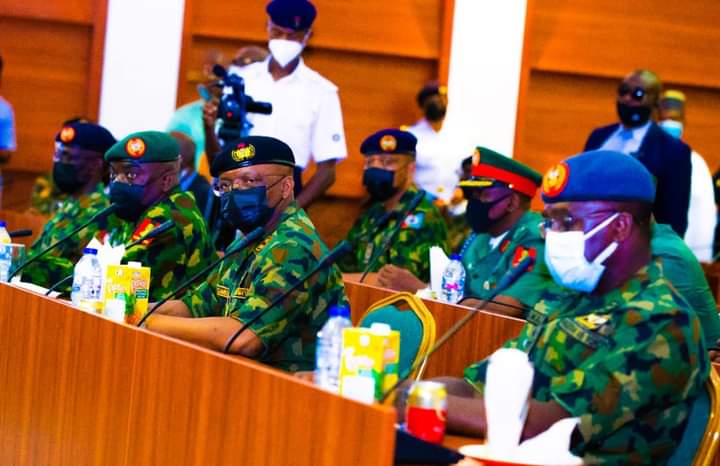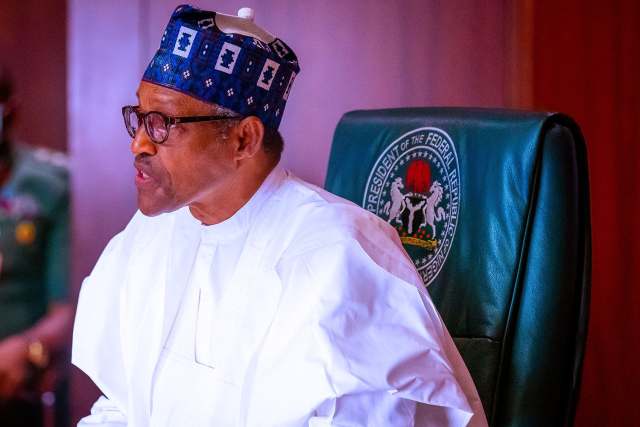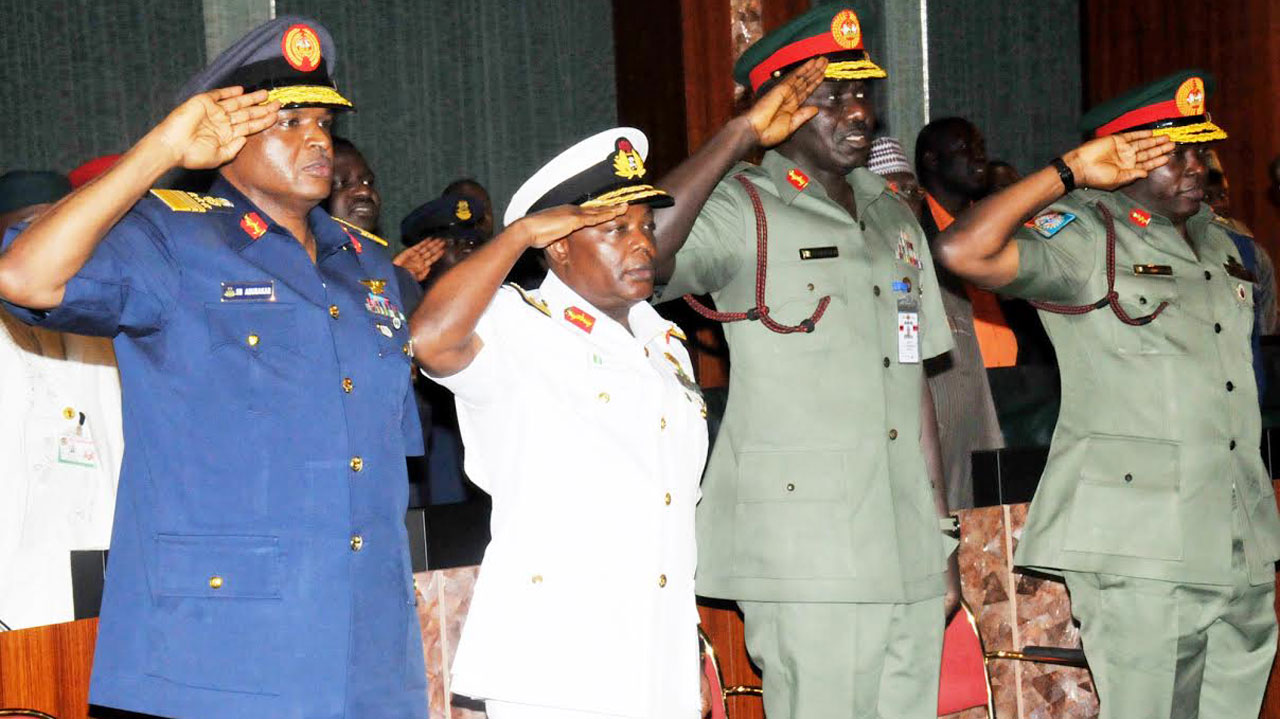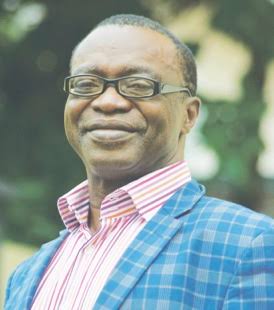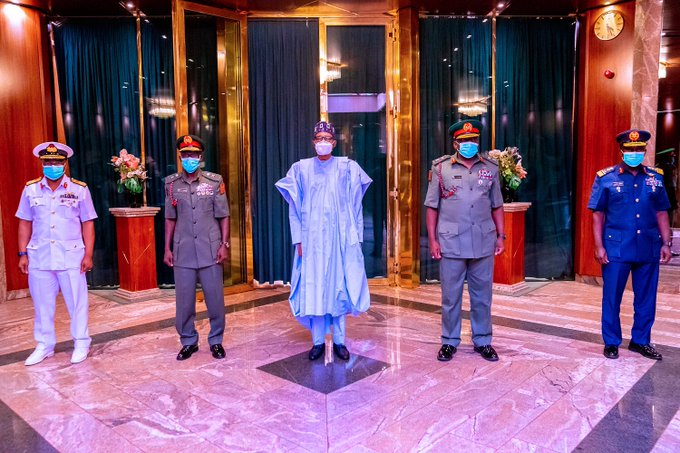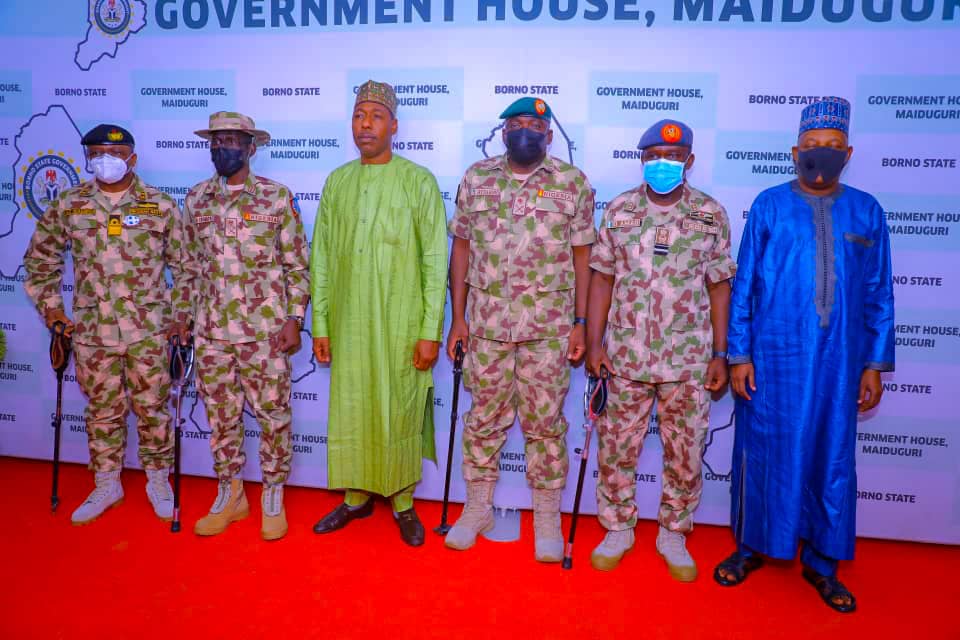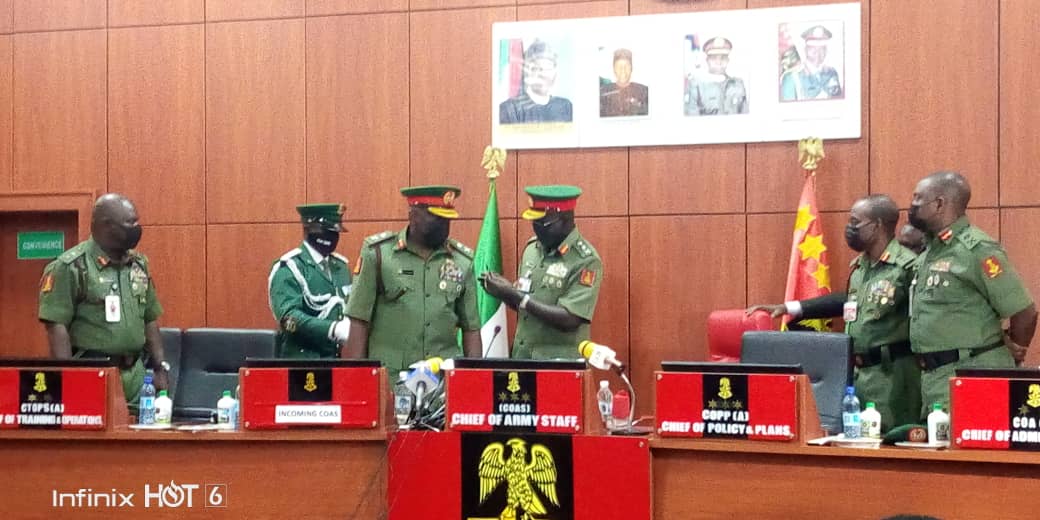Chidi Amuta
The last few days have been full of somewhat excited public responses to the belated change of military service chiefs by President Buhari.
That a routine exercise which came three years late should attract such significant public notice further underlines the now familiar inertness of this presidency.
But at least the president has ‘done something’ by acting on a matter of long standing public concern! It may be a delayed response to prolonged public pressure. It could also be a reaction to the increasing dysfunction of the sacked service chiefs themselves.
In a nation where the most elementary reflexes at the altar of power are dressed in political garb, some political factions and even state governors have since profusely thanked the president for the gallant feat of moving the furniture at the apex of our military hierarchy. It has hardly occurred to observers that the president has merely done what he is paid to do!
The president’s postscript on the change of the former chiefs leaves an untidy trail. In a move unmatched by any previous administration, the presidency has announced the nomination of the immediate past service chiefs for ambassadorial positions even before they got to their homes. The hint is perhaps that the president may have had difficulty firing the chiefs some of whom had become rather politically entrenched to a disturbing extent. There seems to be a trade off of these ambassadorial nominations for the service fiefdoms. Whichever is the case, these nominations are too hasty, untidy and further deepen the wide perception of a fickle presidency.
As it turns out, the ritual of periodic elections do not by any means wholly define a democracy. The prevalence of violent insecurity in a society breaches one of the fundamental requirements of democracy: freedom. And of all freedoms, there is none more basic and priced than freedom from the fear of unplanned death or disabling trauma.
More pointedly, it is a telling sign of the perilous times in which we live that the nation has come to place so much hope in the revolving turnstile of military service chiefs. Some otherwise sensible people actually believe that a change of generals at the helm of the military pecking order can dig us out of the present hole of abysmal insecurity.
A ravaging spate of violent insecurity has besieged the nation. The omnipresence of violence has become a constant feature of our new normal. The mood of public helplessness is so pervasive and overwhelming that people have incrementally lost confidence in the ability of the political leadership to guarantee basic safety of lives and property. Unconsciously, public confidence in matters of public security has shifted from the political leadership to the leaders of war. From a civil democracy presumably at peace, we have glided into a nervous society in a state of undeclared war. Naturally, a nation in a mindset of war idolizes people with greater ability for violence. Generals, ancient hunter warriors, sectional warlords, bandit leaders, even small time neighbourhood thugs and cult mobsters rise to towering prominence. On our new scale of heroism, talkative politicians do not ,unfortunately, count for much even though we are adjudged a democracy!
As it turns out, the ritual of periodic elections do not by any means wholly define a democracy. The prevalence of violent insecurity in a society breaches one of the fundamental requirements of democracy: freedom. And of all freedoms, there is none more basic and priced than freedom from the fear of unplanned death or disabling trauma.
Of the democratic states of the world, we can now distinguish between two classes. First are those states in which prevalent peace can be taken for granted. Incidents of insecurity- the occasional bomb at a railway station, a stabbing episode, a school shooting etc- are only occasional emergencies and disruptions which are quickly brought under control by law enforcement so that normal social life can continue. The advanced democracies of the West and South East Asia (most of Europe, the US, Japan, Singapore, South Korea etc), and the consolidated semi authoritarian states (China, and Russia) belong in this category.
The second category of states are those where permanent insecurity has created a permanent sense of war. In these countries, nasty history, bad religion and chronic inequality have created climates of perennial factional clashes, sectarian terrorism and perpetual protest. In a place like Iraq, the task of nation building has been bedeviled by factional fights between Sunnis and Shiites with the Kurds as partisan onlookers. In places like Somalia and Afghanistan, fundamentalist theocratic pressure is in conflict with the secular essence of the nation state. In yet other places like Venezuela, hunger protests by throngs of unemployed and the desperately poor sends waves of angry mobs into the streets regularly and thus unleashes insecurity in the form of arson, looting and vandalism.
In these places, the nation becomes a virtual permanent garrison. Military fiat and constitutionality compete for primacy. Combat troops in battle fatigue become a regular sight in towns and villages. In the places where the police is the law enforcer of choice, policemen on duty trying to control hostile mobs are not exactly friends of freedoms and rights. In all these places, the architecture of social life is a permanent ruin. But these countries still hold periodic ‘democratic’ elections to choose their leaders but have become presumptive military garrison states. Lebanon, Afghanistan, Venezuela, Iraq, parts of Pakistan, Yemen and Somalia belong in this league.
The amazing curiosity of present day Nigeria is that it is neither a peaceful democracy nor a full- blown ‘democratic’ garrison state. But we have had military contingents on permanent internal security duties in nearly all of our 36 states and the Federal Capital Territory for the better part of the last decade. This is not to say that democracies do not occasionally need the guarantee of the force of arms to defend themselves even from their own factions. The assault and invasion of the US Capitol by Donald Trump inspired extremist mobs on 6th January this year necessitated that continguents of the US National Guard be drafted to secure the Capitol as the venue of the inauguration of Joe Biden as the 46th president of the US. An estimated 30,000 troops flooded Washington DC for the purpose and quickly withdrew once the mission was accomplished.
The choice of the National Guard as against pure theatre combatants was dictated by the low intensity estimate of the domestic terrorist threat. The Guard is an intermediate force, less ferocious than straight combatants but with a greater bite than the civil police. Nigeria’s attempt to establish a National Guard as an intermediating force in the early 1990s under president Babangida was frightened off by professional political shouting squads.
Ordinarily, a change in the leadership of the armed forces should bring in a fresh breath in the effectiveness of our military. The many fronts of our internal security headache makes this change even more welcome. Here is a checklist of our current security nightmares: The Boko Haram insurgency, bandit impunity, brazen kidnapping, armed robbery, mob violence, inter communal warfare, sporadic urban cult clashes and more. It is therefore only natural for a frightened public to expect that a new set of generals at the helm of authorized violence should re-energize the effort to reclaim the peace. Unlike a number of elite commentators, however, I am not quite excited or optimistic that the appointment of the new service chiefs will significantly improve the state of our internal security any time soon.
First, the ineffectuality of our security apparatus in dealing with current security challenges is beyond the cosmetic shifting of four military officers. It is rooted in a certain institutional decay within our military establishment. This is of course part of the general systemic decay of our pubic institutions.
It is hardly believable that the same Nigerian military which fought and ended our civil war in less than three years has spent over a decade trying to contain an armed sectarian insurgency by a bunch of untrained, ill-equipped and unorganized terrorists. Biafra should have been a harder nut to crack. At least it had an armed force of trained officers, a command and control structure, a recognizable hierarchy and was an adversary with a clear territorial and political purpose. Therefore, compared to Boko Haram, Biafra was a more concerted and structured adversary.
The Nigerian armed forces that prevailed over Biafra is the same one that helped to end civil wars in Liberia and Sierra Leone and has participated creditably in several UN operations in Sudan, Lebanon and the Congo. But today, that tried and tested war machine is a sad disorderly ghost of its original self. Our entire military apparatus has for more than a decade been marooned in a disorderly chase after Boko Haram which is merely an opportunistic band of roving vandals, riding around in rickety pick up vans and armed with discarded rocket propelled grenades and old generation AK47s, thanks to recent conflicts in North Africa and the near Middle East.
Clearly then, something has gone fatally wrong with our armed forces in recent years. Arguably, the virus of corruption and accountability deficit that has become the hallmark of our new political culture has invaded the leadership of our defense and security forces. To rise to the apex of any of the armed forces now is to be assured of a retirement in opulence and incredible wealth. Instructively, nearly every post-regime investigation of high level corruption in the country since 1999 has featured service chiefs and senior military officers as defendants. These are cases involving the open stealing and or misappropriation of frightening amounts of public funds. Not long ago, a division commander associated with the security operations in the northern parts of the country was found guilty of stealing cash to the tune of nearly half a billion Naira. As we write this, the EFCC is in the process of selling off high value assets belonging to a former service chief! Specific security operations have been bedeviled by allegations of shameful malfeasance. Some commanders have been accused of pocketing service men’s allowances. Others have been charged with racketeering in dubious arms purchases.
As it were, a nefarious underground economy oiled by dubious arms contracts, security vote racketeering and even outright collusion with insurgents and terrorist organizations has reportedly since developed. The long duration of security operations may not have so much to do with the invincibility of the adversary. These long drawn operations and endless counter insurgency wars may have become a function of keeping the gravy train of security related corruption on track. As it were, insecurity may have become an industry of its own, albeit one that is kept alive by the greed of senior military officers and their sponsoring civilian cohorts. I am not so sure that these institutional infirmities will suddenly disappear simply because Mr. Buhari has just appointed a new set of service chiefs with medal infested new uniforms.
Over and above institutional decay, there is a more fundamental limitation of doctrine, orientation and a sluggish pace of equipment and operational modernization. Like other areas of our modern experience, the world of warfare has undergone a sea change. Technological advances now make it possible for a limited number of men armed with the relevant knowledge and gear to secure vast areas of territory remotely. Various types of unmanned aerial vehicles, drones, overhead satellite and night vision cameras etc. now make it easy to mount 24/7 electronic surveillance of hostile movements and activities over a vast terrain.
From all available evidence, our forces are still mostly trapped in the antiquity of warfare, the realm of manual chases after insurgents and terrorists. We are still sending men with assault rifles and machine guns mounted on pick up vans in hot pursuit of barefoot terrorists across vast stretches. We are still likely to go after lone wolf guerillas embedded with local populations with sluggish armored convoys. Our counter insurgency effort is still heavily weighted in favour of conventional forces as against the urgent necessity for a predominantly special forces operation. Indiscriminate air assaults against constantly mobile targets on the ground can only lead to massive collateral casualties which only heighten the charges of human rights abuses constantly leveled against the Nigerian military by international rights organizations.
In all of this, there is an overarching and more fundamental question. Many agree that Nigeria’s current wave of insecurity poses an existential threat to our young democracy. How do you secure a democracy from vicious internal adversaries? Or, better still, how do you consolidate a democracy when society is assailed from every direction by myriad internal divisions and security challenges?
Clearly, our internal security challenges fall into two broad categories. First, there are quasi military threats that derive from outright armed challenges to the sovereignty of the federal government. What we are witnessing is an increasingly militant contestation of the authority of the federal sovereign by armed factions and tribes under the guise of sectarianism or sectional interests. Insurgent uprisings like Boko Haram, Banditry in the north and piracy in the oil and gas zones of the Niger Delta fall within this category. These threats affront our national cohesion, threaten territorial control and degrade our sovereign integrity. They therefore demand low to medium intensity military engagements and speedy neutralization. The enemy combatants behind these insurgent threats are neither external foes nor common domestic criminals. They are factions of misguided citizens, They could enlist external influences but directly enable and embolden domestic criminality.
On the other hand, we have criminal infractions like transactional kidnapping, armed robbery, cattle rustling, murder and cultism which demand police crime intelligence and control action. These remain the province of police action. Unfortunately, not much effort has been committed to preparing the police force for the giant responsibility of defending a large democracy such as ours. Throughout the period of military rule and up to the return of civilian rule in 1999, not much progress has been made in the effort to prepare the Nigeria police for the task of protecting and securing democracy in our complex and diverse polity.
It is instructive that the tenure of the Inspector General of Police expired almost a the same time thatht he president was changing the service chiefs. Instead of replacing the IGP, Mr. Buhari has opted to keep the incumbent illegally in office through a curious three month tenure extension. Yet it is the police leadership that should have deserved urgency in view of the centrality of the police to securing a democracy.
The apparent preference for military involvement in internal security may be the hangover of prolonged military rule. By the end of the Buhari presidency in 2023, Nigeria will have been under elected former military rulers for 16 years out of 24. Since 1999, no president has instituted a programme of transitioning our internal security from military to police control. No administration, to the best of my knowledge, has drawn up a time table for such a transition. Instead, we have come to adopt military dominance of internal security operations as the norm.
Excessive and prolonged military involvement in internal security operations has consequences both for the military as an institution and for democracy as a way of life. For the military, professionalism and service discipline are being incrementally eroded. Untidy civilian -soldier confrontations degrade the notion of civilian domination of a democratic society. Soldiers have gradually gotten indoctrinated into the vices of the civil society. They get involved in the policing of elections sometimes on the side of one party in the partisan fray. The awe and psychology of reassurance which the presence of soldiers should convey is diluted as soldiers have become a common sight at motor parks, beer palours and local markets! For society itself, the populace is constantly brutalized and gradually losing its consciousness of its rights. Soldiers occasionally beat up civilians in buses, on the streets and other public places. People plying the highways do not like the sight of soldiers at checkpoints demanding gratification, pocketing tips and handouts or extorting ‘tolls’ from motorists.
The new service chiefs deserve the support of the public. But they are assuming office in a vastly altered state of national security. To the extent that they are subject to the authority of civilian political leaders, their effectiveness will be determined by the vision and strategic sagacity of their political bosses. The challenge of the new chiefs is however straightforward. Strengthen the professionalism and effectiveness of the armed forces and assist in internal security within limits. But our political leadership must redefine the interface between national defense and internal security. Yet the urgent political task remains that of de-escalating the tensions that have divided our country into a battlefield of contending factions, tribes and ambitions. Ultimately, our current prevalent insecurity is a product of bad political leadership, not so much the result of defective soldiering.
